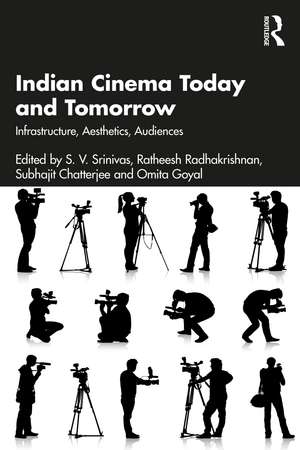Indian Cinema Today and Tomorrow: Infrastructure, Aesthetics, Audiences
Editat de S. V. Srinivas, Ratheesh Radhakrishnan, Subhajit Chatterjee, GOYAL OMITAen Limba Engleză Paperback – 22 aug 2024
This volume covers developments in Indian Cinema over the last decade. It explores an array of changes which has dramatically changed cinema — a surge of new filming and broadcasting technologies, from the camera phone to the most sophisticated digital equipment; an avalanche of talent, from trained to completely untrained actors; and a volume of content difficult to document and categorise. It also studies cinema growth and reactions to the onslaught of home entertainment and discusses its changing formats over the years, from TV to satellite, to VCRs and DVDs, serials to OTT streaming platforms.
This book will be of great interest to scholars and researchers in film studies, performance studies, cultural studies, media studies, and popular culture. It will also interest professionals working in media and entertainment industries.
| Toate formatele și edițiile | Preț | Express |
|---|---|---|
| Paperback (1) | 303.17 lei 3-5 săpt. | +20.08 lei 4-10 zile |
| Taylor & Francis – 22 aug 2024 | 303.17 lei 3-5 săpt. | +20.08 lei 4-10 zile |
| Hardback (1) | 1003.93 lei 6-8 săpt. | |
| Taylor & Francis – 22 aug 2024 | 1003.93 lei 6-8 săpt. |
Preț: 303.17 lei
Nou
Puncte Express: 455
Preț estimativ în valută:
58.01€ • 60.72$ • 48.28£
58.01€ • 60.72$ • 48.28£
Carte disponibilă
Livrare economică 10-24 martie
Livrare express 21-27 februarie pentru 30.07 lei
Preluare comenzi: 021 569.72.76
Specificații
ISBN-13: 9781032793672
ISBN-10: 1032793678
Pagini: 272
Ilustrații: 74
Dimensiuni: 156 x 234 x 17 mm
Greutate: 0.39 kg
Ediția:1
Editura: Taylor & Francis
Colecția Routledge India
Locul publicării:Oxford, United Kingdom
ISBN-10: 1032793678
Pagini: 272
Ilustrații: 74
Dimensiuni: 156 x 234 x 17 mm
Greutate: 0.39 kg
Ediția:1
Editura: Taylor & Francis
Colecția Routledge India
Locul publicării:Oxford, United Kingdom
Public țintă
PostgraduateCuprins
Editorial. Foreword. 1. Introduction 2. Cinema in a Capitalist Republic (In the Making) 3. Is it Post-Cinema? 4. Cynical Realism and the Immobility of the Contemporary 5. ‘It Needs to be More Like a Hindi Film’: Dubbing Hollywood in India 6. Digital Horror in Hindi Cinema 7. Towards Standardisation: Notes on the Indian SVOD Production Apparatus 8. Where is Cinema? COVID–19 and Shifts in India’s Cinemascape 9. Amplification as Pandemic Effect: Single Screens in Telugu Country 10. The #MeToo Movement in the Indian Film Industries: Bringing Sexual Exploitation into Focus 11. Mirzapur 12. Masculinity in Transit: Remaking Male Stardom in Turn-of-the-Millennium Bengali Cinema 13. The Grounds of Cinema: ‘Geo’politics and ‘Geo’aesthetics in Documentaries of India’s Northeast 14. A Change of Address with Filmfare Middle East 15. The Absent Fullness of ‘Not-Yet Cinema’ 16. Films in Progress 17. Aspirational Cinema: Circuits of Cinephilia, Amateur Films and Local Film Festivals 18. Happy Together: Cinema’s Collective Futures 19. Archive ‘Stories’: Indian Film Memorabilia in the Age of New Media Public 20. Through Charulata’s Opera Glass: Re-viewing the Cinema-Effect 21. Filmic Afterlives: Considerations on the Uncanny
Notă biografică
Subhajit Chatterjee is Assistant Professor, Department of Film Studies, Jadavpur University, Kolkata.
Ratheesh Radhakrishnan teaches literature and film at the Department of Humanities and Social Sciences, Indian Institute of Technology, Mumbai.
S.V. Srinivas is Professor at the School of Arts and Sciences, Azim Premji University, Bengaluru.
Omita Goyal is Chief Editor, IIC Quarterly, Journal of the India International Centre, New Delhi.
Ratheesh Radhakrishnan teaches literature and film at the Department of Humanities and Social Sciences, Indian Institute of Technology, Mumbai.
S.V. Srinivas is Professor at the School of Arts and Sciences, Azim Premji University, Bengaluru.
Omita Goyal is Chief Editor, IIC Quarterly, Journal of the India International Centre, New Delhi.
Descriere
Cinema has been, and is, a powerful tool for social mobilisation. The political importance of cinema was of course always well-known and has continued to evolve and grow. However, with innovations in modern technology, there has been the exponential growth of television alongside the movies, as well as social media.
